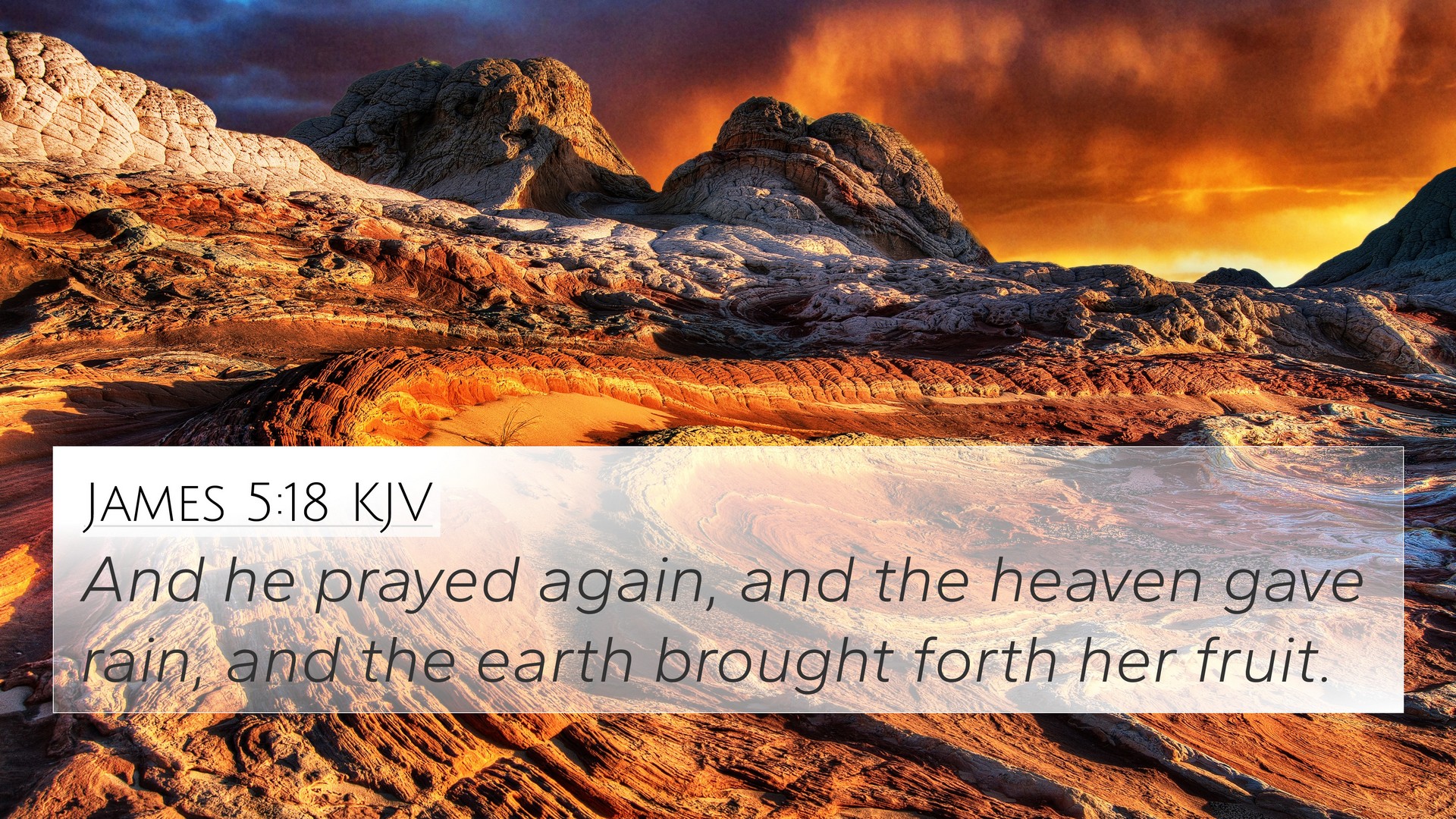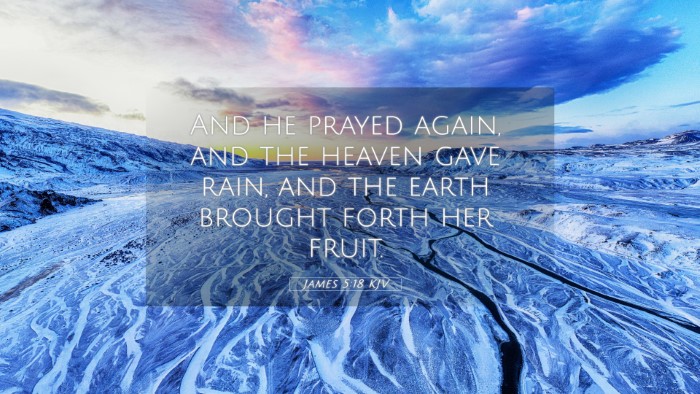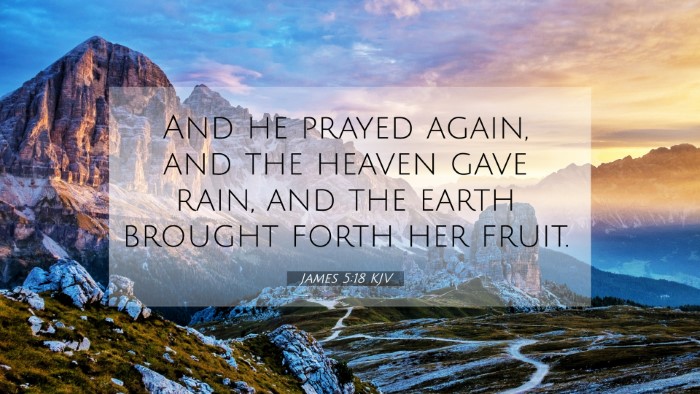Old Testament
Genesis Exodus Leviticus Numbers Deuteronomy Joshua Judges Ruth 1 Samuel 2 Samuel 1 Kings 2 Kings 1 Chronicles 2 Chronicles Ezra Nehemiah Esther Job Psalms Proverbs Ecclesiastes Song of Solomon Isaiah Jeremiah Lamentations Ezekiel Daniel Hosea Joel Amos Obadiah Jonah Micah Nahum Habakkuk Zephaniah Haggai Zechariah MalachiJames 5:18 Similar Verses
James 5:18 Cross References
And he prayed again, and the heaven gave rain, and the earth brought forth her fruit.
Uncover the Rich Themes and Topics of This Bible Verse
Listed below are the Bible themes associated with James 5:18. We invite you to explore each theme to gain deeper insights into the Scriptures.
James 5:18 Cross Reference Verses
This section features a detailed cross-reference designed to enrich your understanding of the Scriptures. Below, you will find carefully selected verses that echo the themes and teachings related to James 5:18 KJV. Click on any image to explore detailed analyses of related Bible verses and uncover deeper theological insights.
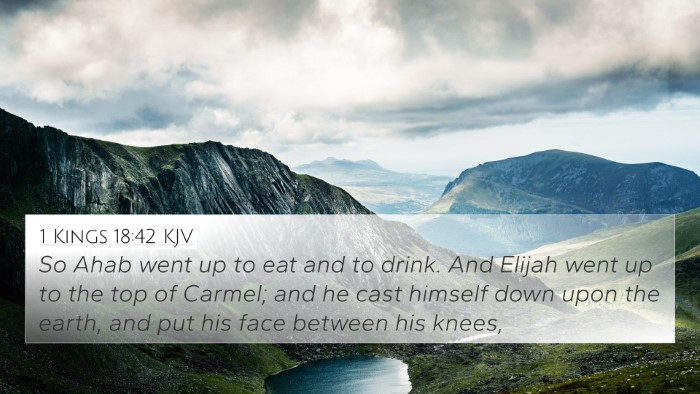
1 Kings 18:42 (KJV) »
So Ahab went up to eat and to drink. And Elijah went up to the top of Carmel; and he cast himself down upon the earth, and put his face between his knees,
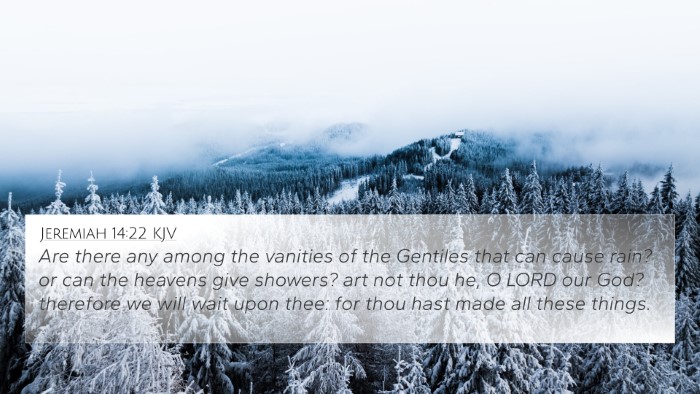
Jeremiah 14:22 (KJV) »
Are there any among the vanities of the Gentiles that can cause rain? or can the heavens give showers? art not thou he, O LORD our God? therefore we will wait upon thee: for thou hast made all these things.

1 Kings 18:18 (KJV) »
And he answered, I have not troubled Israel; but thou, and thy father's house, in that ye have forsaken the commandments of the LORD, and thou hast followed Baalim.
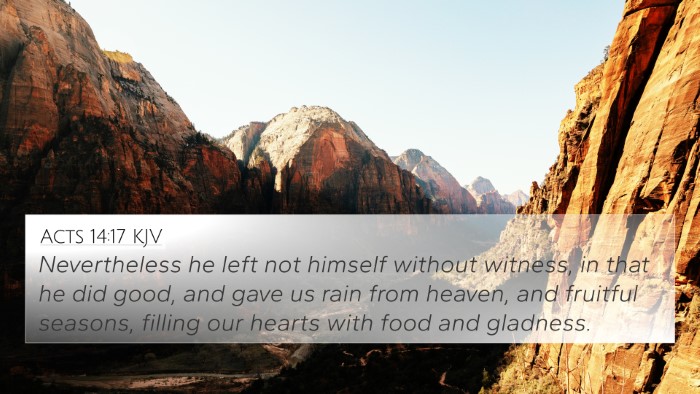
Acts 14:17 (KJV) »
Nevertheless he left not himself without witness, in that he did good, and gave us rain from heaven, and fruitful seasons, filling our hearts with food and gladness.
James 5:18 Verse Analysis and Similar Verses
Understanding James 5:18
James 5:18 states, "And he prayed again, and the heaven gave rain, and the earth brought forth her fruit." This verse serves as a profound reminder of the power of prayer and its direct connection to God's will and creation. Let us delve into the verse’s meaning with insights drawn from the commentaries of Matthew Henry, Albert Barnes, and Adam Clarke.
Insights from Commentaries
-
Matthew Henry:
Matthew Henry emphasizes the fervency and faith of Elijah's prayer, which led to God’s miraculous response—bringing rain after a prolonged drought. This illustrates that earnest prayers can result in divine intervention and the realization of God’s promises. Henry indicates that the narrative of Elijah exemplifies the relationship between obedience to God and effective prayer.
-
Albert Barnes:
Albert Barnes elaborates on the historical context of Elijah, highlighting his pivotal role as a prophet who prayed for Israel. Barnes notes that the heavenly response to his prayer not only ended the drought but also emphasized the theme of spiritual revival. This act serves as a symbol of hope and restoration, showcasing God’s readiness to respond to the prayers of His faithful servants.
-
Adam Clarke:
Adam Clarke focuses on the significance of prayer in the context of community and individual repentance. He encourages believers to view this verse as a call to unity in prayer, suggesting that collective supplication can lead to profound change, both in the natural and spiritual realms. Clarke points out that the dual themes of prayer and divine response are prominent throughout Scripture.
Thematic Connections to Cross-Referenced Verses
James 5:18 connects with several other scriptures that reinforce its themes of prayer, faith, and God's power. Below are notable cross-references that expand on these concepts:
- 1 Kings 17:1: Elijah proclaims a drought, setting the stage for God's miraculous acts.
- 1 Kings 18:41-46: Describes Elijah's prayer for rain and its fulfillment.
- 2 Chronicles 7:14: A call to humility, prayer, and repentance that emphasizes God’s response.
- Hebrews 11:6: Highlights the necessity of faith in approaching God, relevant to Elijah’s trust in prayer.
- Matthew 7:7: Encourages believers to ask, seek, and knock, correlating with the themes of James 5:18.
- Mark 11:24: Jesus teaches about the power of belief in prayer, similar in essence to James' instruction.
- 1 Thessalonians 5:17: Paul exhorts continual prayer, reinforcing the active role of prayer in a believer’s life.
- John 14:13-14: Promises that whatever is asked in Jesus' name will be done, highlighting faith in prayer.
- James 5:16: Preceding verse that discusses the effectual fervent prayer of a righteous man.
- Acts 12:5: The church's prayer for Peter illustrates collective prayer's impact, paralleling Elijah’s story.
Conclusion
The overall message of James 5:18, supported by the insights of Matthew Henry, Albert Barnes, and Adam Clarke, underscores the incredible power of prayer—whether made individually or collectively. The cross-referenced verses enrich our understanding of how prayer interlaces with faith, repentance, and God’s responsiveness to His people.
Bible Verse Cross-References and Connections
Utilizing tools for Bible cross-referencing enhances our understanding and interpretation of scripture. By examining connections between Bible verses, we can draw deeper insights into God’s word and the themes of prayer and divine intervention. This comparative Bible verse analysis considers the links between the narratives of prophets and the teachings within the New Testament, particularly how Old Testament prayers find their fulfillment within the life and ministry of Jesus and the Apostles.
Exploring a Cross-Reference Bible Study Method
Engaging in a cross-reference Bible study can be enriching. Here are some effective methods:
- Use a Bible Concordance: Search for key terms related to prayer and identify verses that discuss their significance.
- Employ a Cross-Reference Guide: Utilize guides that provide thematic links, such as those related to the power of prayer and its impact on God’s actions.
- Engage in Thematic Studies: Focus on themes like faith, prayer, and divine response across both Testaments to see their interrelatedness.
- Compare Different Authors: Examine how various Biblical authors discuss prayer and its outcomes, especially in the context of intercession.
- Consider Contextual Studies: Look at the historical and cultural context of the verses to gain insight into their meanings.
